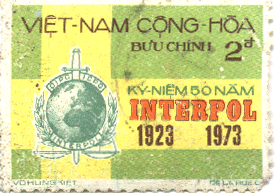|
| |
|
|
| |
|
| |
 - -  - -  - -  - -  |
| |
|
| |
|
|
| |
| Trang 1 - Trang 2 - Trang 3 - Trang 4 - Trang 5 - Trang 6 |
| |
| Trang 7 - Trang 8 - Trang 9 - Trang
10 |
| |
|
| |
|
 |
| |
Interpol là tên gọi thường dùng của Tổ chức Cảnh sát Hình sự Quốc tế (tiếng Anh: International Criminal Police Organization), một tổ chức liên chính phủ được thành lập ngày 7 tháng 9 năm 1923 tại Viên, Áo với mục đích củng cố hoạt động chung của các cơ quan cảnh sát quốc gia.
Interpol có một ngân sách hàng năm khoảng 70 triệu Euro, hầu hết trong số đó được cung cấp thông qua đóng góp hàng năm của 190 quốc gia thành viên. Trước đây, tổ chức có văn phòng thường trực tại Paris, nhưng từ ngày 1 tháng 5 năm 1989 thì trụ sở chính chuyển về tại Lyon, Pháp. Đây là tổ chức liên chính phủ lớn thứ hai chỉ sau Liên Hiệp Quốc về số quốc gia thành viên. Trong năm 2012, Interpol có tổng cộng 703 nhân viên đại diện tại 98 quốc gia thành viên.[1] Tổng thư ký của tổ chức hiện nay là Jürgen Stock, một người đã từng giữ chức phó giám đốc cục cảnh sát hình sự liên bang Đức. Chủ tịch hiện nay của INTERPOL cho tới 2020 là Mạnh Hoành Vĩ, từng là thứ trưởng bộ công an Trung Quốc.[3]
Interpol bao gồm 190 thành viên. Interpol là tổ chức trung lập về chính trị, và hiến chương của nó không cho phép can thiệp về vấn đề này, ít nhất là về mặt lý thuyết, đó là thực hiện các hoạt động chính trị, quân sự, tôn giáo, hoặc có tính chất phân biệt chủng tộc.[4] Công việc của tổ chức này tập trung chủ yếu về an toàn công cộng và chiến đấu với chủ nghĩa khủng bố, tội ác chống lại nhân loại, tội phạm môi trường, tội phạm diệt chủng, tội ác chiến tranh, tổ chức tội phạm quốc tế, vi phạm bản quyền, đánh cắp tác phẩm nghệ thuật, sản xuất và vận chuyển, buôn bán ma túy, buôn lậu vũ khí, buôn người, rửa tiền, khiêu dâm trẻ em, tội phạm cổ cồn trắng, tội phạm công nghệ cao, tội phạm về sở hữu trí tuệ và tham nhũng. Việc xử lý dữ liệu tại Interpol được theo dõi bởi Ủy ban độc lập theo Điều 36 của Điều lệ Interpol. Nó bao gồm năm người họp ba lần một năm. Nó kiểm tra khiếu nại, yêu cầu truy cập vào các hồ sơ và cơ sở dữ liệu.[5] và đưa ra các khuyến nghị về việc truy nã có nên được duy trì hay không. |
| |
| |
| |
The International Criminal Police Organisation (ICPO-INTERPOL; French: Organisation internationale de police criminelle), more commonly known as INTERPOL (UK: /ˈɪnt.ər.pɒl/ INT-ər-pol, US: /-poʊl/ -pohl),[4] is an international organisation that facilitates worldwide police cooperation and crime control. Headquartered in Lyon, France, it has seven regional bureaus worldwide and a National Central Bureau in all 194 members states, making it the world's largest police organization.[5]
INTERPOL originated with the first International Criminal Police Congress in 1914, which brought officials from 24 countries to discuss cooperation on law enforcement matters. It was founded in 1923 as the International Criminal Police Commission (ICPC), adopting many of its current duties throughout the 1930s. After coming under Nazi control in 1938, the agency was effectively moribund until after the Second World War. In 1956, the ICPC adopted a new constitution and the name INTERPOL, derived from its telegraphic address used since 1946.[6]
INTERPOL provides investigative support, expertise, and training to law enforcement worldwide, focusing on three major areas of transnational crime: terrorism, cybercrime, and organized crime. Its broad mandate covers virtually every kind of crime, including crimes against humanity, child pornography, drug trafficking and production, political corruption, copyright infringement, and white-collar crime. The agency also facilitates cooperation among national law enforcement institutions through criminal databases and communications networks. Contrary to popular belief, INTERPOL is itself not a law enforcement agency.
INTERPOL has an annual budget of around €113 million (GBP £99 million) (US$131 million), most of which comes from annual contributions by member police forces in 181 countries. It is governed by a General Assembly, composed of all member countries, which elects the Executive Committee and the President—currently Kim Jong Yang of South Korea—to supervise the implementation of INTERPOL's policies and administration. Day-to-day operations are carried out by the General Secretariat, comprising around 1,000 personnel from over 100 countries, including both police and civilians. The Secretariat is led by the Secretary General, currently Jürgen Stock, the former deputy head of Germany's Federal Criminal Police Office. |
| |
| Source: https://en.wikipedia.org/ |
| |
| Tổ chức Cảnh sát Hình sự Quốc tế |
| |
|
| |
| |
| |
|
|